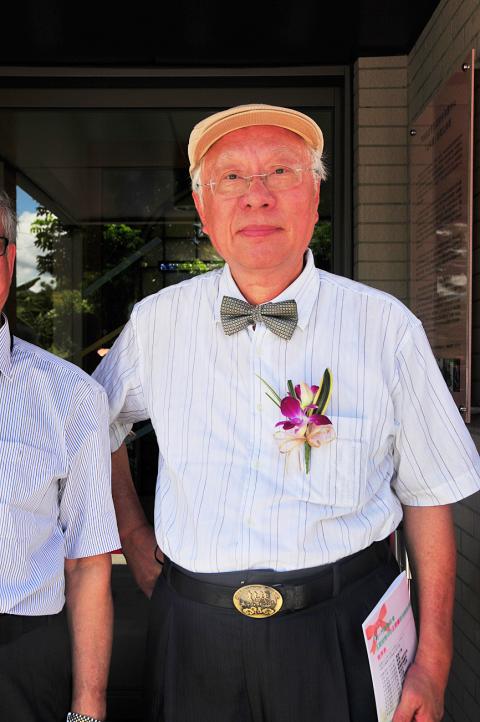The nation should change the name of its national team to “Taiwan” to correct a historical mistake, veteran Taiwanese independence activist Chen Yung-hsing (陳永興) said yesterday during a televised debate on Saturday’s referendums.
Chen, a former superintendent of St Mary’s Hospital in Yilan County’s Luodong Township (羅東) and founder of the online media outlet Taiwan People News, criticized the Chinese Taipei Olympic Committee’s opposition to the name-change referendum.
He also criticized its failure to join the debate to explain its position.

Photo: Hua Meng-ching, Taipei Times
The committee has said that it would be unacceptable for the national team not to use the name “Chinese Taipei” and has tried to scare athletes from supporting the referendum, he said.
The referendum was initiated by National Policy Adviser to the President Chi Cheng (紀政), a three-time Olympian and winner of the bronze medal in the women’s 80m hurdles in 1968.
“Would it be embarrassing for the national team to use the name ‘Taiwan’ in competitions?” Chen said. “Whose orders are you following? Are you listening to China?”
An agreement signed in 1981 by the Chinese Taipei Olympic Committee in Lausanne, Switzerland, requiring that Taiwan use the name “Chinese Taipei” in the Olympics was humiliating and akin to forfeiting sovereignty, he said.
It was acceptable in the past for the team to use the name “Taiwan,” as it did in the 1960 Rome Olympics, 1964 Tokyo Games and 1968 Mexico City Games, he said.
Taiwan boycotted the 1976 Montreal Olympics after the team was prohibited from using any reference to the Republic of China at the Games due to Canada’s recognition of the People’s Republic of China.
The International Olympic Committee (IOC) had voted 58-2 to allow Taiwan to participate under the name “Team Taiwan,” but Chiang Kai-shek (蔣介石) objected to the name and recalled the team.
Chiang’s abstinence and refusal to concede to China was the source of the national team’s problems that continue today, Chen said.
More than 10 nations have changed the names of their teams, he said, such as the change from the Soviet Union to Russia.
The use of the name “Chinese Taipei” was agreed to by Taiwan under a dictatorship that no longer exists, Chen said, adding that the team’s name should be changed to achieve transitional justice.
“Taiwan has never been governed by China, why would we not use our own name, ‘Taiwan,’” for the national team, Chen said.

Chinese Nationalist Party (KMT) Chairman Eric Chu (朱立倫), spokeswoman Yang Chih-yu (楊智伃) and Legislator Hsieh Lung-chieh (謝龍介) would be summoned by police for questioning for leading an illegal assembly on Thursday evening last week, Minister of the Interior Liu Shyh-fang (劉世芳) said today. The three KMT officials led an assembly outside the Taipei City Prosecutors’ Office, a restricted area where public assembly is not allowed, protesting the questioning of several KMT staff and searches of KMT headquarters and offices in a recall petition forgery case. Chu, Yang and Hsieh are all suspected of contravening the Assembly and Parade Act (集會遊行法) by holding

PRAISE: Japanese visitor Takashi Kubota said the Taiwanese temple architecture images showcased in the AI Art Gallery were the most impressive displays he saw Taiwan does not have an official pavilion at the World Expo in Osaka, Japan, because of its diplomatic predicament, but the government-backed Tech World pavilion is drawing interest with its unique recreations of works by Taiwanese artists. The pavilion features an artificial intelligence (AI)-based art gallery showcasing works of famous Taiwanese artists from the Japanese colonial period using innovative technologies. Among its main simulated displays are Eastern gouache paintings by Chen Chin (陳進), Lin Yu-shan (林玉山) and Kuo Hsueh-hu (郭雪湖), who were the three young Taiwanese painters selected for the East Asian Painting exhibition in 1927. Gouache is a water-based

Taiwan would welcome the return of Honduras as a diplomatic ally if its next president decides to make such a move, Minister of Foreign Affairs Lin Chia-lung (林佳龍) said yesterday. “Of course, we would welcome Honduras if they want to restore diplomatic ties with Taiwan after their elections,” Lin said at a meeting of the legislature’s Foreign Affairs and National Defense Committee, when asked to comment on statements made by two of the three Honduran presidential candidates during the presidential campaign in the Central American country. Taiwan is paying close attention to the region as a whole in the wake of a

OFF-TARGET: More than 30,000 participants were expected to take part in the Games next month, but only 6,550 foreign and 19,400 Taiwanese athletes have registered Taipei city councilors yesterday blasted the organizers of next month’s World Masters Games over sudden timetable and venue changes, which they said have caused thousands of participants to back out of the international sporting event, among other organizational issues. They also cited visa delays and political interference by China as reasons many foreign athletes are requesting refunds for the event, to be held from May 17 to 30. Jointly organized by the Taipei and New Taipei City governments, the games have been rocked by numerous controversies since preparations began in 2020. Taipei City Councilor Lin Yen-feng (林延鳳) said yesterday that new measures by